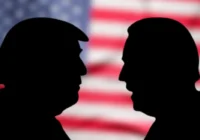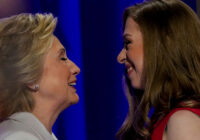Landon Shroder looks at the turbulent debate on Middle East foreign policy in what appears to be a near endless campaign cycle for the next American president.
Now that the US presidential election is only a mere 291 days away from maturity, we must content ourselves with the inevitable salvo of attack ads, over the top rhetoric and fearmongering—all of which will be linked to the interminable foreign policy debate that is helping shape the 2016 election. Naturally, the Middle East will remain the most hallowed territory, as each candidate squabbles over the most climacteric and esoteric foreign policy challenges since World War II. Or as the esteemed P.G. Wodehouse might surmise, “Hell’s foundations have begun quivering.”
As consumers of politics then, our challenge not only becomes making sense of the arguments that have already been presented, but anticipating those that might develop in response to the rapid pace of events throughout the Middle East. This is essential because the intensity of rhetoric will only confuse our understanding of the situation as the countdown to the first primaries in Iowa and New Hampshire start to get closer.
So, how do we evaluate the universe of competing narratives that are shaping the foreign policy landscape on the campaign trail?
For starters, we should expect the candidates to bring forward ideas that are interdependent on three things: diplomatic objectives, security strategies and economic outputs. Or in my own caustic vocabulary, the “unholy trifecta” since foreign policy cannot really succeed without these three things maintaining some sense of equilibrium.
As a result, any foreign policy advanced by the presidential candidates must also be robust enough to integrate these things into broad strategies that can account for nuance, singularity and complexity—each of which are deeply present in the modern Middle East.
Unfortunately, this is not happening in large doses, and the debate (for the most part) is being compelled by bombastic oratory in the Republican camp and conformity to the status quo in the Democratic camp. Yet neither side has brought forward comprehensive policy solutions that are novel in their approach or address the root causes of instability and conflict in the region.
What we do have are solutions that will either revive or prolong the conditions that have led to the very same conflict and instability in the first place.
Nevertheless, as consumers of politics, we must understand our purchasing power and what we are buying. So let’s take a look at some of the more overt foreign policy themes that are driving the debate during this election cycle.
A Very Republican State of Affairs
There is no doubt that the Republican candidates are maintaining some fringe foreign policy positions that exist in a very special place far removed from the realities of planet Earth—candidates like Donald Trump, Ted Cruz, Ben Carson and Chris Christie are leading this charge. However, once the volume is turned down a notch (from eleven), there have been some very reasonable debates over the role of regime change, nation-building and the promotion of democracy by Rand Paul, Marco Rubio, Jeb Bush and John Kasich.
The problem with most of the candidates’ foreign policy in a complex region like the Middle East is that it is instinctively reactive. They address the symptoms and outcome of conflict, but not the underlying causes such as endemic sectarianism, corruption or legacy issues surrounding US intervention(s). Sidestepping these issues, furthermore, allows the candidates to shirk their own party’s faults and miscalculations by heaping blame on President Barack Obama, while at the same time supporting strategies that are not overly dissimilar from his own—especially in the fight against the Islamic State (IS).
This is a sleight of hand political maneuver that voters need to be aware of when assessing their own foreign policy positions. (But more on this later.)
The most stark foreign policy positions continue to coalesce around the Iranian nuclear deal, which was ratified in July 2015. While rapprochement is paying diplomatic dividends, there is still a general feeling of malaise and dread that is pervasive between the GOP candidates.
Other differences exist over Russia, Turkey and support for Israel, but any position on Iran is almost unanimous in its condemnation. Nonetheless, this opposition is becoming harder to maintain, since the benchmarks set forward in the nuclear deal are now coming to fruition and Iran’s nuclear infrastructure is getting dismantled. As a result, the sanctions are being lifted (cue volume back to eleven) and the process of normalization remains ongoing.
All of which is bad for Republican candidates’ foreign policy brand, since they have led us to believe that this will be a doomsday scenario of biblical proportions, and yet the exact opposite appears to be happening.
In the end, there is not vast daylight between the two parties on foreign policy in the Middle East, since both sides are developing positions that are becoming uniquely similar, given the realities on the ground.
The leading candidates will inevitably maintain this position of hostility, but there is almost no recourse to scrap the deal or reconstitute sanctions—regardless of what they might hypothesize. Not without a serious breach of etiquette on behalf of the Iranians or the risk of isolating the US from other international partnerships on IS, Iraq and Syria, which are currently under negotiation. Suggestions to the contrary are little more than specious subterfuge that is being used to motivate the base of the Republican Party.
But let’s get back to the Islamic State and the candidates’ sleight of hand.
In a recent article I wrote for Fair Observer, titled “The Middle East in 2016,” I wagered that most foreign policy positions on IS will soon start to resemble one another. This is because the options available to the US are actually quite limited. The thematic points the candidates are rallying around—enhanced intelligence, airstrikes, regional coalition building and special forces deployments—are already being done in places where IS militants are active and where the US can reach them.
There are a few notable exceptions, such as arming the Kurdish Peshmerga in northern Iraq or a no-fly zone in Syria, but the Republican candidates are not unified around these proposals. Nor are they particularly pragmatic. Yet despite this, they are being used to amplify a certain perspective that is about style, not substance. Remember the unholy trifecta of international relations—diplomacy, security and economy? This is where these things start to intersect, since arming factions independent of the central government and implementing no-fly zones in crowded airspace only undermines the potential for diplomacy while locking the US into intractable security positions.
Alternatively, the Republican foreign policy debate has highlighted some incredibly substantive issues, such as the role of nation-building, regime change and the promotion of democracy in the Middle East. Conversations such as these are essential in understanding how the next president might project influence abroad and gets to the very core of how most Americans assess their place in the world.
This is a conversation that is essential in how we develop our views and vote on foreign policy. How these concepts have been previously translated and acted (or not acted) on has set the tempo for most US strategy in the region—look no further than the wars in Iraq and Afghanistan and ongoing issues in Syria, Yemen and Libya.
On Democrats, Doctrine and Dogma
The foreign policy debate on the Democratic side is much less interesting and far more contained, given the lack of candidates and self-assured magniloquence of the Republican ticket, but here we are nonetheless.
Given the immense amount of experience Hillary Clinton has on the international circuit, the Democratic foreign policy debate has naturally been shaped around her role as the former secretary of state. Additionally, the Democratic National Committee has only graced us with a lackluster total of four debates (compared to the Republican six) and, by default, foreign policy issues have become reactive to her worldview.
In real terms, though, neither of the candidates is likely to stray far from the president’s current strategy in the Middle East. Obama has played a careful long game, which is making incremental gains and, as a result, he has coopted most of the available strategic and tactical space to fight IS, which is now steadily losing ground in Iraq. Moreover, the nuclear deal and relative détente with Iran is proving advantageous, as are negotiations with the various world and regional powers over Syria.
These accomplishments have satiated the Democratic base, and each of the candidates will attempt to ride the coat-tails of these perceived successes, taking credit for them where they can. A good balance has also been struck between diplomacy and security for US foreign policy (two out of the three components of the unholy trifecta isn’t bad), and none of the three candidates will want to shift away from this.
Discrepancies do exist over certain policy positions, however, but these divergences originate from practical standpoints, not from ideological posturing that assumes the US is no longer an effective superpower (as the Republicans would suggest). For Democrats, this has manifested over plans to defeat the Islamic State, engagement with Iran, and what kinds of interventions are appropriate expressions of US foreign policy. Each of these three points is being used as a cudgel to either defend, promote or assail each of the candidates’ foreign policy credentials in the Middle East.
This has turned the foreign policy debate on the Democratic side into point-counter-point, exacerbating the rhetoric over Clinton’s support for the Iraq War and Bernie Sanders’ plan to normalize relations with Iran. All this has done is regrettably detract from the fundamental conversation on how to promote stability and end conflict in the Middle East. These are two things that voters need to be desperately conscious of as incidents of terrorism increase globally and conflict in the region grinds on.
Republicans vs. Democrats: Tomato, Tomato
In the end, there is not vast daylight between the two parties on foreign policy in the Middle East, since both sides are developing positions that are becoming uniquely similar, given the realities on the ground. Tone and presentation will continue to vary, of course, as will fringe positions on carpet bombing IS-controlled cities, dog fighting Russian warplanes over Syria and seizing Iraq’s oil. But these are not serious proposals and, for our sake, did not warrant critical examination.
What voters need to be aware of in this election cycle is that the total sum of US foreign policy since the invasion of Iraq in 2003 has led us to a point where the best that can be expected is the maintenance of whatever status quo is prevalent. Being an interventionist or an internationalist is hardly relevant anymore, since the best options currently available for the US to defeat the Islamic State, repair stability and end conflict in the Middle East remain quite limited.
Until creative, non-traditional strategies are expanded and candidates—on both sides—can develop solutions that are not based on how the Middle East used to be but on how it is reshaping our foreign policy, a vote in 2016 will likely be a vote for more of the same.
That is unless Donald Trump becomes president and Sarah Palin our new secretary of defense, then we would truly have something remarkable to write about. Cast your vote accordingly, America.
The views expressed in this article are the author’s own and do not necessarily reflect Fair Observer’s editorial policy.
Photo Credit: Cienpies Design / GrAl / Shutterstock.com
 We bring you perspectives from around the world. Help us to inform and educate. Your donation is tax-deductible. Join over 400 people to become a donor or you could choose to be a sponsor.
We bring you perspectives from around the world. Help us to inform and educate. Your donation is tax-deductible. Join over 400 people to become a donor or you could choose to be a sponsor.
Support Fair Observer
We rely on your support for our independence, diversity and quality.
For more than 10 years, Fair Observer has been free, fair and independent. No billionaire owns us, no advertisers control us. We are a reader-supported nonprofit. Unlike many other publications, we keep our content free for readers regardless of where they live or whether they can afford to pay. We have no paywalls and no ads.
In the post-truth era of fake news, echo chambers and filter bubbles, we publish a plurality of perspectives from around the world. Anyone can publish with us, but everyone goes through a rigorous editorial process. So, you get fact-checked, well-reasoned content instead of noise.
We publish 2,500+ voices from 90+ countries. We also conduct education and training programs
on subjects ranging from digital media and journalism to writing and critical thinking. This
doesn’t come cheap. Servers, editors, trainers and web developers cost
money.
Please consider supporting us on a regular basis as a recurring donor or a
sustaining member.
Will you support FO’s journalism?
We rely on your support for our independence, diversity and quality.







